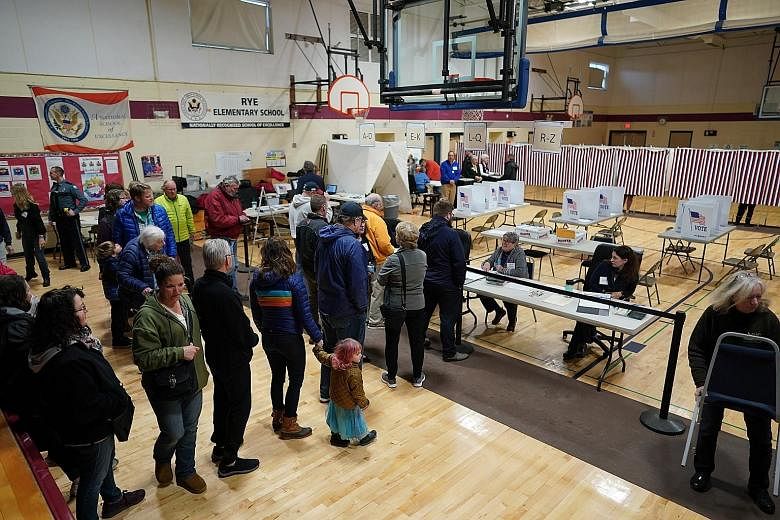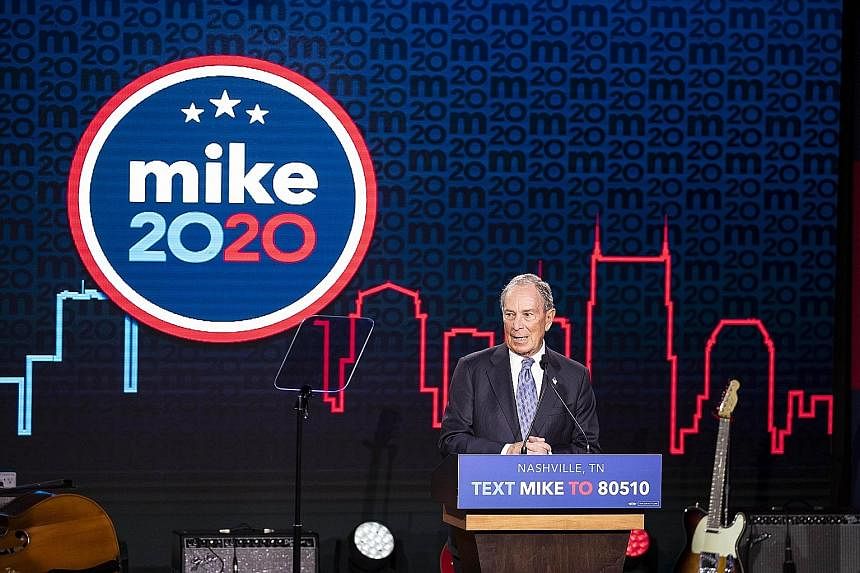MANCHESTER (New Hampshire) • The Democratic presidential primary is entering an intensely tumultuous phase, after two early contests that have left former vice-president Joe Biden reeling and elevated Senator Bernie Sanders, but failed to make any candidate a dominant force in the battle for the party's nomination.
Within the Democratic establishment, the results have deepened a mood of anxiety and frustration: The collapse of Mr Biden's support in the first two states, and the fragmentation of moderate voters among several other candidates, allowed Mr Sanders, a Vermont progressive, to claim a thin victory in New Hampshire and an apparent split decision in Iowa with former mayor Pete Buttigieg of South Bend, Indiana.
In both states, a majority of voters supported candidates closer to the political centre and listed defeating President Donald Trump as their top priority, but there was no overwhelming favourite among those voters as to which moderate was the best alternative to Mr Sanders.
Unless such a favourite soon emerges, party leaders may increasingly look to Mr Michael Bloomberg as a potential saviour.
In an unmistakable sign of Mr Bloomberg's growing strength and Mr Biden's decline, three black members of Congress endorsed the former mayor of New York City on Wednesday, including Representative Lucy McBath of Georgia, a high-profile lawmaker and gun-control champion in her first term.
A senior adviser to Mr Bloomberg told campaign staff that internal polling showed that the former mayor was now tied with Mr Biden among African Americans in states voting in the March primaries.
The turmoil in the party has the potential to extend the primary season, exacerbating internal divisions and prolonging the headache of uniting for the general election for months.
The Democrats' proportional system of allocating delegates and the nature of the calendar this year could make it all but impossible to avert such an outcome.
With no winner-takes-all contests, and no indication yet that Mr Sanders can broaden his appeal or that a moderate can coalesce support, the candidates are poised to keep splitting delegates three or four ways, as they did in Iowa and New Hampshire.
The leading candidates are plainly worried about the party's divisions, and signalled as much in their speeches in New Hampshire on primary night: Mr Sanders, blamed by much of the party for his slashing approach to the 2016 primaries, stressed in his victory speech that the most important task was defeating Mr Trump, while Mr Buttigieg urged his supporters to "vote blue, no matter who" in November.
In a particularly urgent plea, Senator Elizabeth Warren of Massachusetts, who slumped to a fourth-place finish on Tuesday, warned that no candidate should be "willing to burn down the rest of the party in order to be the last man standing".
Unless another Democrat rapidly consolidates support, Mr Sanders could continue to win primaries and caucuses without broadening his political appeal, purely on the strength of his rock-solid base on the left - a prospect that alarms Democratic Party leaders who view Mr Sanders and his slogan of democratic socialism as wildly risky bets in the election.
There is no sign that any of the half-dozen major candidates left in the race are headed for the exits: Mr Buttigieg and Mr Biden will have to contend in the Nevada caucuses against Senator Amy Klobuchar of Minnesota, who finished a strong third in New Hampshire, while on the left Mr Sanders still faces a dogged competitor in Ms Warren.
Unless one candidate comes out of Nevada and South Carolina with a powerful upper hand, it is quite likely that the same atomised delegate count could continue into Super Tuesday, when 15 states and territories, accounting for nearly 40 per cent of all delegates in the Democratic race, cast ballots on March 3.
Indeed, with early voting already taking place in California and other Super Tuesday states, and no dominant front runner, the fragmentation may already be well under way.
In Arkansas, a Super Tuesday state where early voting starts next week, a poll taken after Iowa illustrated the Democrats' dilemma: Mr Bloomberg, Mr Biden, Mr Sanders and Mr Buttigieg were each winning 16 per cent to 20 per cent of the vote.
All of the other candidates are increasingly confronting Mr Bloomberg's presence as a rival in the March primaries. He skipped all four February contests, but has climbed into double digits in national polls on the strength of an enormous and sustained advertising campaign, funded from his personal fortune. But Mr Bloomberg is facing new tests as a candidate: For the first time, he may qualify for a televised debate next week and he has come under direct criticism from other Democrats for his record on policing and much else.
Some Democrats are turning to what they believe is a more simple solution. Early last month, Representative Gregory Meeks of New York offered an off-the-cuff assessment of the Democratic race: Should Mr Biden wheeze in the early states, many in the party would turn to Mr Bloomberg as a Plan B.
"If Mr Biden can't get out of New Hampshire and Iowa, then Mr Bloomberg has Super Tuesday," Mr Meeks said at the time.
On Wednesday, he was one of the three black lawmakers who endorsed Mr Bloomberg.
NYTIMES


